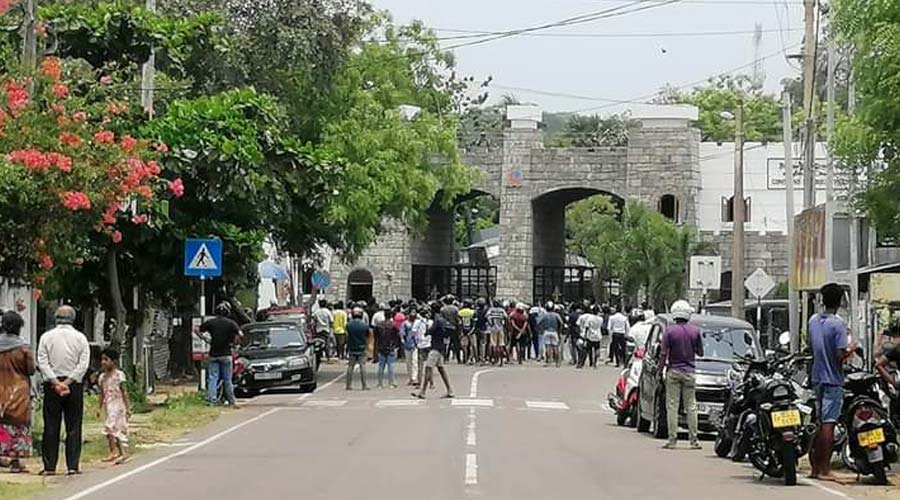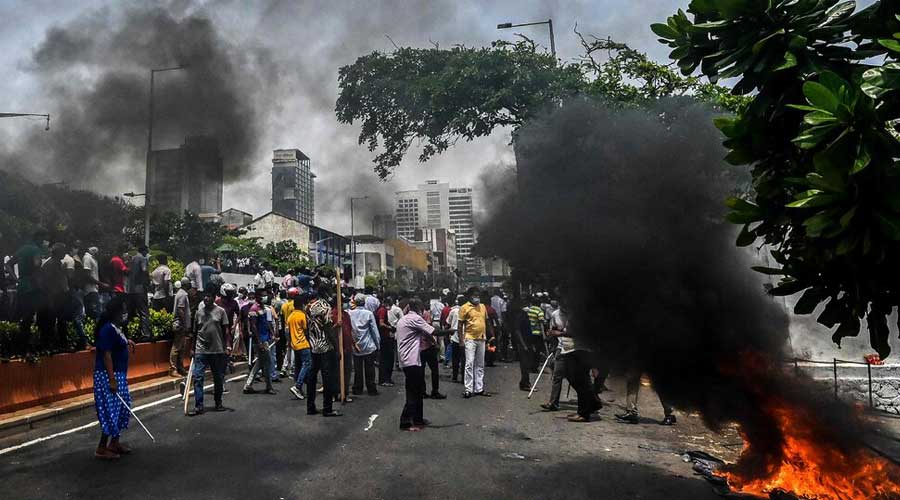Former Sri Lankan Prime Minister Mahinda Rajapaksa and his family had to take shelter at a naval base in Trincomalee in the north-east part of the island nation on Tuesday as violent protests escalated amid the country’s worst ever economic crisis.
The former Prime Minister, who resigned on Monday in the hope of quelling the protests, was flown to the naval base along with his family, NDTV reported.
Sources told the television channel that protests had also broken out outside the naval base, some 270 km from capital Colombo.
Sri Lanka deployed thousands of troops and police to enforce a nationwide curfew after eight persons were killed in the worst violence in weeks of protests over the unprecedented economic crisis. Nearly 200 were also wounded on Monday as Mahinda Rajapaksa resigned.
The former prime minister had to be rescued in a pre-dawn operation by the military on Monday after thousands of anti-government protesters poured into his official residence in Colombo overnight, with police firing tear gas and warning shots to keep back the crowd.
Opposition politicians are demanding the arrest of Mahinda Rajapaksa for inciting violence against peaceful anti-government protesters that also saw arson attacks on the homes of several politicians including his own.
The resignation of the prime minister has automatically annulled the Cabinet and the country is currently being run by his younger brother and President Gotabaya Rajapaksa.
Mahinda Rajapaksa has been accused by the Opposition of inciting the ruling party mobs to attack peaceful protesters by making a defiant speech while addressing several thousands of his supporters to deflect calls for his resignation.
"Rajapaksa (Mahinda) must be arrested and brought before the law," M A Sumanthiran, the main Tamil legislator, said in a message. Similar sentiments were expressed by former President Maithripala Sirisena and the main Opposition Samagi Jana Balawegaya party's leader Ranjith Madduma Bandara.
"He must be arrested for encouraging violence. There was no reason to attack the peaceful protesters," Sirisena said.
Eight killed in violence
At least eight persons were killed in the violence. The Colombo national hospital said at least 217 people had been admitted for treatment. One of the protesters who had been brutally assaulted by the Rajapaksa supporters remains in a very critical condition.
There were reports from all parts of the island of arson attacks on buses and the homes of ruling party politicians, including on the ancestral house of the Rajapaksa family in the deep southern district of Hambantota, which is 250km away from here. .
Mahinda Rajapaksa later resigned, saying he was making way for his brother president Gotabaya Rajapaksa to set up an all-party interim government. He vacated Temple Trees, the official residence of the prime minister, Tuesday morning, according to media reports.
Demand to reconvene Parliament
The Opposition parties urged the reconvening of Parliament before the scheduled date of May 17. Speaker Mahinda Yapa Abeywardena also requested the President to immediately summon Parliament.
Trade unions announced that they would launch a continuous strike from Tuesday to protest against the government-backed crackdown on the peaceful protests.
The violence occurred as pressure mounted on the embattled government led by President Gotabaya to form an interim administration to overcome the worst economic crisis facing the country.
Unprecedented economic crisis
Sri Lanka is currently in the throes of unprecedented economic turmoil since its independence from Britain in 1948. The crisis is caused in part by a lack of foreign currency, which has meant that the country cannot afford to pay for imports of staple foods and fuel, leading to acute shortages and very high prices.
Thousands of demonstrators have hit the streets across Sri Lanka since April 9 seeking the resignation of President Gotabaya and Prime Minister Mahinda, as the government ran out of money for vital imports; prices of essential commodities have skyrocketed and there are acute shortages in fuel, medicines and electricity supply.
In a special Cabinet meeting on Friday, President Gotabaya Rajapaksa declared a state of emergency with effect from Friday midnight. This is the second time that an emergency was declared in Sri Lanka in just over a month as the island nation was in the grip of the worst economic crisis.












